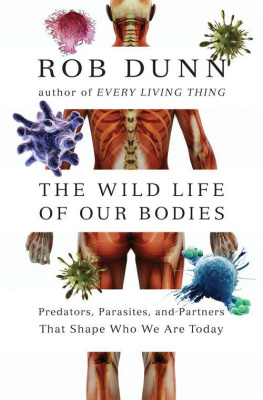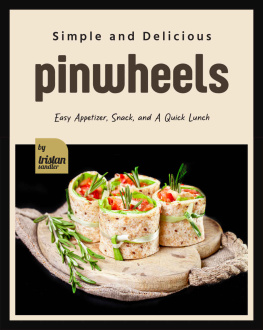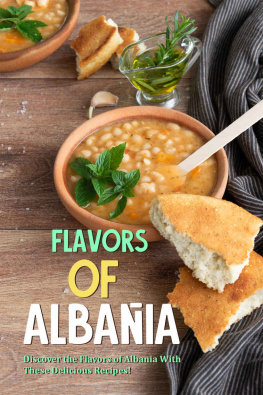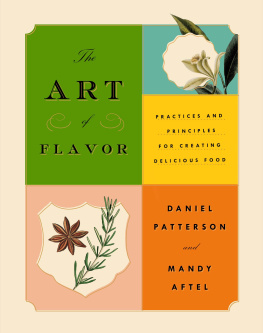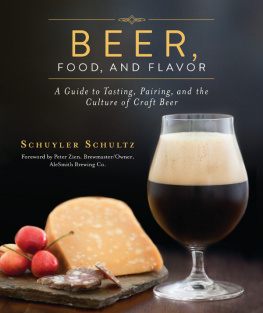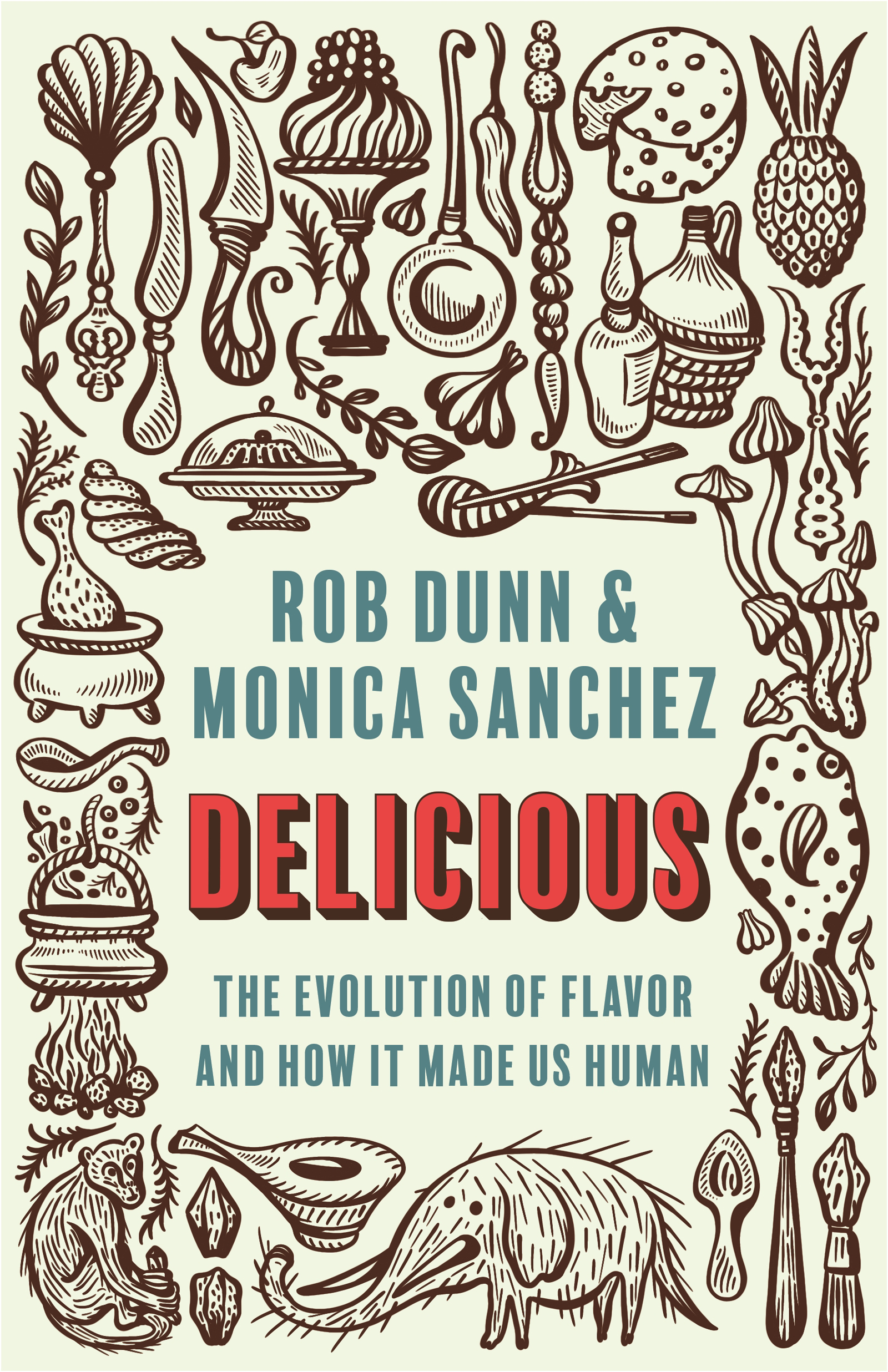DELICIOUS
Delicious
THE EVOLUTION OF FLAVOR AND HOW IT MADE US HUMAN
Rob Dunn and Monica Sanchez
PRINCETON UNIVERSITY PRESS
PRINCETON AND OXFORD
Copyright 2021 by Rob Dunn
Requests for permission to reproduce material from this work should be sent to
Princeton University Press is committed to the protection of copyright and the intellectual property our authors entrust to us. Copyright promotes the progress and integrity of knowledge. Thank you for supporting free speech and the global exchange of ideas by purchasing an authorized edition of this book. If you wish to reproduce or distribute any part of it in any form, please obtain permission.
Published by Princeton University Press
41 William Street, Princeton, New Jersey 08540
6 Oxford Street, Woodstock, Oxfordshire OX20 1TR
press.princeton.edu
All Rights Reserved
Library of Congress Cataloging-in-Publication Data
Names: Dunn, Rob R., author. | Sanchez, Monica (Anthropologist) author.
Title: Delicious : the evolution of flavor and how it made us human / Rob Dunn and Monica Sanchez.
Description: Princeton : Princeton University Press, [2021] | Includes bibliographical references and index.
Identifiers: LCCN 2020037562 (print) | LCCN 2020037563 (ebook) | ISBN 9780691199474 (hardcover) | ISBN 9780691218342 (ebook)
Subjects: LCSH: TastePhysiological aspects. | SmellPhysiological aspects. | PerceptionPhysiological aspects. | Flavor.
Classification: LCC QP456 .D86 2021 (print) | LCC QP456 (ebook) | DDC 612.8/7dc23
LC record available at https://lccn.loc.gov/2020037562
LC ebook record available at https://lccn.loc.gov/2020037563
Version 1.0
British Library Cataloging-in-Publication Data is available
Editorial: Alison Kalett, Whitney Rauenhorst
Production Editorial: Terri OPrey
Text Design: Karl Spurzem
Jacket Design: Jessica Massabrook
Production: Jacqueline Poirier
Publicity: Sara Henning-Stout, Kate Farquhar-Thomson
Copyeditor: Jodi Beder
Jacket illustrations by Natalya Balnova / Marlena Agency
Why do we eat?
In order to pursue the flavor of things.
HSIANG JU LIN AND TSUIFENG LIN []
PROLOGUE: ECO-EVOLUTIONARY GASTRONOMY
The human craving for flavor has been a largely unacknowledged and unexamined force in history.
ERIC SCHLOSSER, FAST FOOD NATION
A number of years ago, on a path on top of our favorite island in Croatia, we stumbled upon a series of abandoned structures. Later it would become clear that they were stone pens in which people once kept sheep. The structures were circular and immense, and in amongst them we also found the remains of what appeared to be a house once inhabited by a family. These ruins may well have been thousands of years old. The island was long inhabited by Illyrian pastoralists. It has been argued that these pastoralists were the inspiration for the Cyclopes in Homers Odyssey. They slept in stone houses or caves and lived lives dependent upon sheep, the milk of sheep, the meat of sheep, and even the wool of sheep. The structures we found might have been Illyrian. Or they might have been far more recent. The island is a place in which ancient structures and newer ones comingle easily in ways that are not always legible. We had come to these structures after having visited, earlier in the day, a cave lower on the island in which hunter-gatherers had lived some twelve thousand years prior. And wed come to the island after having visited a cave on the mainland in which Neanderthals and ancient humans once cohabitated (it was a very good couple of days). In each of these places wed paused with our two kids to look out over the landscape that these peoples once inhabited. When we did, we also ate. In the Cyclopean landscape, for example, we nibbled on a bit of bread with fresh fig preserves and sipped some of a friends homemade Plavac Mali wine. In these moments, we wondered what those earlier peoples thought when looking out on the landscapes on which we now looked. It is easy to imagine that some of the things we find beautiful they might also have found beautiful. But we also started to wonder about something else. As we savored our food, we began to wonder what flavors the ancient peoples savored. Did the cyclopean pastoralists, for example, have a favorite cheese? Did the paleolithic hunter-gatherers have favorite berries? How much farther might a Neanderthal go to search out the best-tasting prey? These questions were fun. It was easy, at the end of a wonderful day of exploring, to get lost in them.
Later, we started to read more about the diets of paleolithic and more recent peoples, their diets and their pleasures. As we did we realized that while the diets of the peoples of the past are very often measured and discussed, they are almost never talked about in the way that we would talk about our own meals. Our own meals are, on a good day, about pleasure. Those of the ancients, well, of course, they were about survival. In confronting the past, scientists and other scholars had taken the pleasure and deliciousness out of food.
One of us (Rob) is an ecologist and evolutionary biologist and the other (Monica) is an anthropologist. We imagined that one of our fields must have considered the role of deliciousness in the decisions our ancestors made. But neither had. Evolutionary biologists talk about the optimal decisions that animals make, without talking about how they make them. Historically, theyve often tended to assume animals are a bit like robots, able to measure their environments perfectly and respond. A subset of the scholars who study human hunter-gatherers do the same. Search scholarly papers for optimal foraging and hunter-gatherer and you will find hours of reading. But search for the three terms optimal foraging, hunter-gatherer, and flavor and the pickings are slim and a bit unusual. On the other hand, cultural anthropologists have tended to focus on the unpredictable power of culture. Culture can make someone ferment a shark or eat ants. Dont try to explain it, or so the literature seemed to suggest. Yet, as we traveled around the world and met with people of diverse cultures, we found that they nearly all talked about food and flavor and what is and is not delicious. This was as true in a thatch house in the Bolivian Amazon as it was in palace in Portugal.
Increasingly, we had the feeling that we had accidentally come upon a radical idea, namely that humans and other animal species prefer to eat delicious things when given the choice. Even as we write this, it is shocking that this idea could be novel, much less radical, and yet it has been ignored. Mostly.
Quite apart from ecology, evolutionary biology, and anthropology exists a field called gastronomy. Gastronomy began with a book called Physiologie du got, published by the French gastronome Jean Anthelme Brillat-Savarin in 1825.[
Foods that are a pleasure to eat are delicious; to be delicious is to have exceedingly good flavors, pleasing flavors, sensuous flavors, even voluptuous flavors. At the time that Brillat-Savarin published his book, the study of deliciousness was the territory of bakers, brewers, vintners, cheesemakers, cooks, chefs, gourmands, and gourmets. For philosophers and scientists, the mouth was a backwater, too ordinary and vulgarall teeth, spit, and tongueto be taken seriously. Brillat-Savarin took the mouth seriously. Napoleon had been deposed a decade earlier. France was reinventing itself. It was a time for sweeping statements about the world. As a gourmand, Brillat-Savarin would make those statements from the perspective of pleasure in general and deliciousness in particular. He blended what chefs knew, what scientists were beginning to learn, and his own sometimes prescient insights. The book was beautiful and radical. It was also ridiculous and idiosyncratic (including, for example, a list of Brillat-Savarins favorite sayings such as A dinner without cheese is like a beautiful woman with one eye). Despite its quirks, or perhaps in part because of them, the book offered the hypotheses and questions that would ultimately precipitate thousands of discoveries and insights. It was one of the seeds around which gastronomic sciences nucleated.


